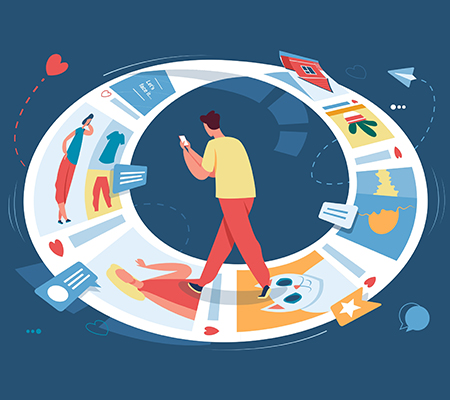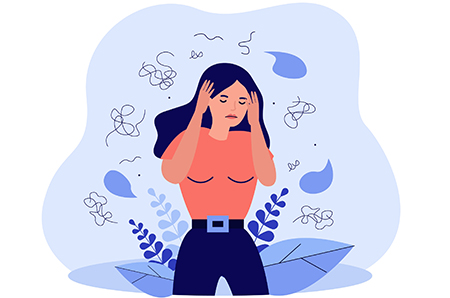 Which comes first? Anxiety or depression?
Which comes first? Anxiety or depression?
Anxiety and depression can feel like two sides of the same coin. Your anxiety prevents you from doing the things you want or need to do, and then you beat yourself up for not being able to do things, sliding into depression and feeling worthless.
Or, because your depression has made it impossible to take care of things, your anxiety goes through the roof as you try to complete a week’s worth of tasks in two days. And so, you cycle back and forth between the two.
 Self-doubt voices scream, ‘You’re not good enough!’
Self-doubt voices scream, ‘You’re not good enough!’
Michelle* is in her late 20s and works in a creative field, but she doesn’t feel that her current job allows her to express her creativity fully. She wants to engage in artistic endeavors in her free time but struggles to find the motivation.
Her depression makes her feel too tired after work to create, but she also feels anxious that what she creates might not be ‘good enough.’
It’s not just being creative, though. She also finds herself immobilized in other situations – making phone calls and paying bills. She avoids these tasks until things are late and the situation worsens. So, she stays frozen, wanting to do more but finding it impossible to move forward.
I supported Michelle in confronting the self-doubting voices in her head. We practiced role-playing conversations that made her uncomfortable until they didn’t seem so difficult anymore. We practiced turning off her internal sensor and making art for just ten minutes. Gradually, we lengthened that time until she was able to enjoy self-expression again.
Michelle still experiences anxiety, self-doubt, and depression at times, but she now has the tools to work through those feelings. She doesn’t let them stop her from doing what she wants.
 Social anxiety is Peter’s nemesis.
Social anxiety is Peter’s nemesis.
Peter* is in his 30s and works in tech. When he’s not working, he spends hours each day “doom scrolling” through the news of the day. Feeling guilt and panic about the state of the world, the injustices occurring, and fears of climate change, his depression immobilizes him from acting.
Peter also experiences social anxiety. He wants to date and make new friends, but thoughts of self-doubt make it difficult. He worries people won’t like him and that he has nothing to offer.
We started setting a timer on his doom scrolling, gradually shortening the amount of time he spent on it. This gave him more free time to fill, and we talked about filling that time with volunteering for causes that were important to him, turning his anxiety into activism.
Peter also started making friends through volunteering. It became easier to talk to people because they were working side by side and could talk about the cause they supported, which took the pressure off coming up with conversation topics.
Peter still worries about the future of the world and his role in it, but he feels more empowered now that he’s doing something about it. He also has a full social life and is well connected to other people who share his passion for working toward improving things.
 Don’t ignore emotions that originate in anxiety and depression.
Don’t ignore emotions that originate in anxiety and depression.
Anxiety and depression can create what feels like insurmountable barriers to doing things you want and need to do. But you don’t have to let them stop you anymore.
We never want to repress or ignore these emotions or pretend they don’t exist. This isn’t about “pulling yourself up by your bootstraps” or a “positive vibes only” mentality. That doesn’t work because when we ignore our emotions, they usually get stronger, louder, and more overpowering until we finally have no choice but to stop and listen.
We’ll explore them together instead of trying to push your anxiety and depression away. Where do they come from? What are they trying to tell you?
We can accept these thoughts and feelings exist and make space for them, but that doesn’t mean we have to believe them when they tell us that we’re worthless or that trying to do something is a waste of time because we’ll never succeed.
Instead, we can let them have their say for a limited time and then we start pushing back.
What are some reasons why that thought might not be true? What are some reasons why we might want to try something anyway? How can we break a huge, overwhelming task into smaller, bite-sized steps that no longer feel overwhelming?
Sometimes, something as simple as changing the sequence of how we say something can make a huge difference. For example, we might habitually say, “I want to go to the party, but I’m too nervous.” Said this way, “I’m too nervous” is the conclusion. It ends the possibility of going.
But what if we reverse the order of the phrases and say, “I’m nervous, but I want to go to the party.” In this order, we leave the possibility open that we can still do what we want, despite feeling anxious about it.
There are specific techniques that help you conquer anxiety and depression.
Sometimes, challenging thought patterns isn’t enough. We can also work with your nervous system using breathing exercises and yoga techniques that help to move your nervous system from a state of fight or flight into rest and digest.
The vagal nerves run from your brain down to your lower intestines, passing through every organ system on the way. These nerves control your autonomic nervous system. This explains why your emotional state affects your heart rate, breathing and digestion.
Activities such as taking deep breaths, meditating, and doing yoga can help “increase vagal tone,” helping your nervous system become more harmonious. I can also teach you simple, physical exercises that you can do in one minute that will help engage your vagal nerves and reset your nervous system.
 Mind-body connection?
Mind-body connection?
I don’t believe there’s a mind-body connection. They’re not connected – they’re one entity! Your brain is a part of your body. Therefore, we’ll look at every part of you.
Your diet and exercise habits can play a huge role in your mental health, as can sleep habits, substance use, prescription and over-the-counter medications, and social engagement. So, we’ll look at every aspect contributing to your depression and anxiety.
One small step forward puts you on the road to your dreams.
Together, we’ll tackle one item at a time. This may feel overwhelming, but we will break things down and take them one at a time in manageable pieces, starting with the things that feel more comfortable for you.
It’s a huge undertaking, but I think you’re worth it. As we start isolating the causes of your distress, you’ll start feeling better, which will help build motivation to move forward to the next step. You’ll start to build the strength needed to break through what has been holding you back and take steps toward reaching the life of your dreams.
Let’s start now! Please contact me.
*Names changed to protect client confidentiality.

